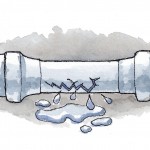Got leaks? Here’s how to find out
October 15, 2014Don’t let a little leak add up to big charges on your water bill.
We sometimes get requests from customers seeking a discount when they’ve lost water because of a leak in their home. Unfortunately, we cannot provide discounts for water lost because of leaks, because our nonprofit business model requires that we charge for the actual cost of service to the property. Water that’s provided by LCA costs the same to produce — even when it is lost in a leak.
Leaks are the responsibility of the customer, and should be fixed in a timely manner. It will save you money, and also conserve water that otherwise would be wasted.
If you suspect you have a water leak but can’t track it down, there are a few things you can do.
First, check all fixtures in your house for drips. It may not seem like much, but over time a slow drip from a faucet adds up to a lot of wasted water. Check the hoses to your washing machine and dishwasher, too — slow leaks can turn suddenly into water gushing out of a burst pipe or hose.
Secondly, check your toilets. Remove the top of the tank and put your ear close. If there’s a leak, you’ll often hear a dripping, burbling or hissing sound.
If you can’t find anything, try putting a few drops of food coloring in the tank (NOT in the bowl). Wait a few minutes or longer, and then check the water in the bowl — if the dye has seeped into the bowl, there’s a leak in the flapper.
If you’d like special dye tablets, contact LCA — we’ll mail them out to you.
Another good place to check is the hot water tank. There is a pressure relief valve that sometimes drips. In some cases, they’ve been hooked directly into a drain — meaning that if it’s leaking, you probably won’t notice it right away. Check the drain pipe if it’s accessible, or listen carefully for a dripping or hissing sound.
If there are puddles of water near the water heater and the drain or pressure relief valves aren’t leaking, it’s likely the tank itself has a leak. If that’s the case, don’t waste time — call a plumber as soon as possible. Leaky water heaters will often burst suddenly and can cause extensive, expensive damage.
A leak could also be hidden inside the walls of the house. To check, ensure that all the faucets are turned off. If you have a leaky faucet, turn off the supply valves closest to the faucet.
Now check your water meter. If no water is entering the house, it should not be registering any flow. Make a note of the meter’s reading, and then — leaving all faucets and valves turned off — check again in an hour or two. If the numbers have changed, it’s fairly likely you have a leaky pipe inside the walls of the house.
Finally, keep a close eye on your water usage. If it suddenly spikes, it’s likely due to a leak.
As always, if you have any questions, don’t hesitate to contact us. And if you’re not comfortable finding or repairing a leak yourself, contact a licensed plumber.